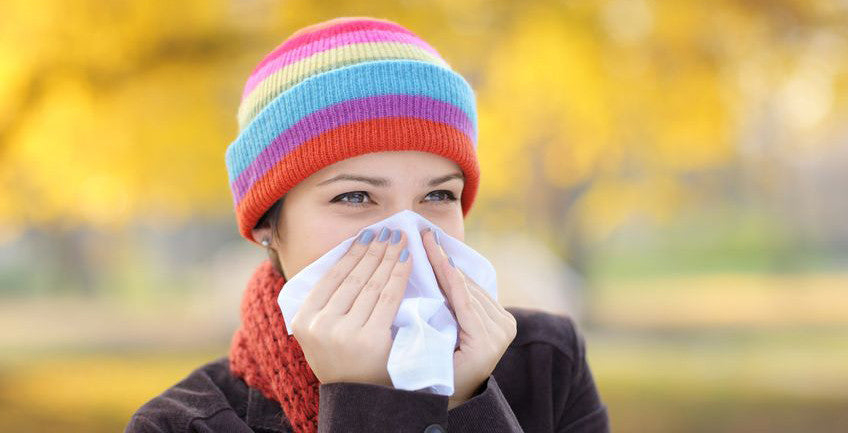
We’re coming out of winter here in Sydney. Spring is in the air. The birds are chirping and blossoming flowers scent the air with sweet fragrance, but rather than fully enjoying the beginning of the new season, my two year old brought home a cold from childcare as a final parting gift from the grey drudgery of winter. It came resplendent with a sore throat, dripping nose and watering eyes.
My son was miserable and pretty soon so was I. As we both sneezed and spluttered our way through our days, my husband valiantly trooped on looking after us and making sure we were fed and rested. I kept searching him for signs of the illness, expecting any day to hear him complain of a scratchy throat or headache. But my husband completely evaded the virus. He told me he was having a good week and ‘just didn’t feel like getting a cold’.
It got me wondering about the mind body connection and the common cold. Is there a link between a positive attitude and our susceptibility to getting sick? It turns out; research shows there is. Professor Sheldon Cohen from Carnegie Mellon University and his team of researchers called for willing volunteers to be infected with the rhinovirus (also known as the common cold). Why 354 people ended up volunteering to be intentionally given a cold is beyond me, but given they were quarantined in a hotel room for five days, maybe some thought of it as a holiday. Maybe the $800 they were paid for their time was another motivator?
The researchers took subjective measurements by asking them how they were feeling and objective measurements like blood and mucus samples. The results were fascinating. Happier people were less likely to develop a cold than unhappy people. You might be thinking, well that’s not revelatory. Positive people are probably more likely to look after themselves by getting more sleep, eating better and exercising more frequently, which makes them healthier and less likely to get sick. While the researchers did find that people with the positive emotional style (or PES) did tend towards healthier behaviours, they found the positivity was correlated with a lower risk of getting a cold independently of these healthy behaviours. The scientists even controlled for age, weight, gender and whether or not people may have already been immune to the virus they’d been exposed to.
You might also be thinking that perhaps positive people reported fewer symptoms because they are, well, positive people. But the results held for both the subjective and objective measurements used by the scientists. Their conclusion was simple. A tendency to experience positive emotions is associated with greater resistance to developing a common cold.
It’s remarkable to see that science is catching up with what ancient wisdom has known all along; and indeed more and more studies are associating positivity with better outcomes for sick people including reducing risk of stroke among elderly people, reducing risk of rehospitalization after heart problems and even improved pregnancy rates among women undergoing IVF.
Despite the compelling results that Cohen and his team found, there was still a vexing question on their minds. Was it that a positive outlook was health protective after their volunteers were exposed to the cold virus, or was it that a negative outlook was health damaging?
The scientists again returned to the lab, convincing another 199 healthy volunteers to be exposed to the cold virus. Not only did they replicate their previous findings, but they also concluded that having a negative outlook did not correlate with susceptibility to getting sick. This is to say; it may be the absence of positive emotions, rather than the presence of negative ones that makes us vulnerable.
For me, this is an important take away. It’s not that we should be papering over our negative emotions, and worry that they’re making us sick. I think feelings like sadness, grief, regret and even anger are essential to the fabric of being human. But the work of Cohen and his team does hint at the importance of nurturing positivity.
So next time you feel a cold coming on, you may want to consider giving yourself a mood boost. You could try listening to music, having a massage, writing in a journal, walking in nature, or taking a nap which have all been shown to do some good. If you do get sick, asking for lots of hugs may help. Cohen and his team found that hugging was associated with less severe symptoms and a faster recovery. This has a lot to do with the power of social support when it comes to health, which I’ve written about before. You might like to wear a mask though, unless you can offer them a five night stay in a hotel room or $800, your kindhearted bestowers of hugs might not be too pleased if they catch your cold.





 The Connection (DOWNLOAD-TO-OWN)
The Connection (DOWNLOAD-TO-OWN) My Year Of Living Mindfully - Book
My Year Of Living Mindfully - Book




